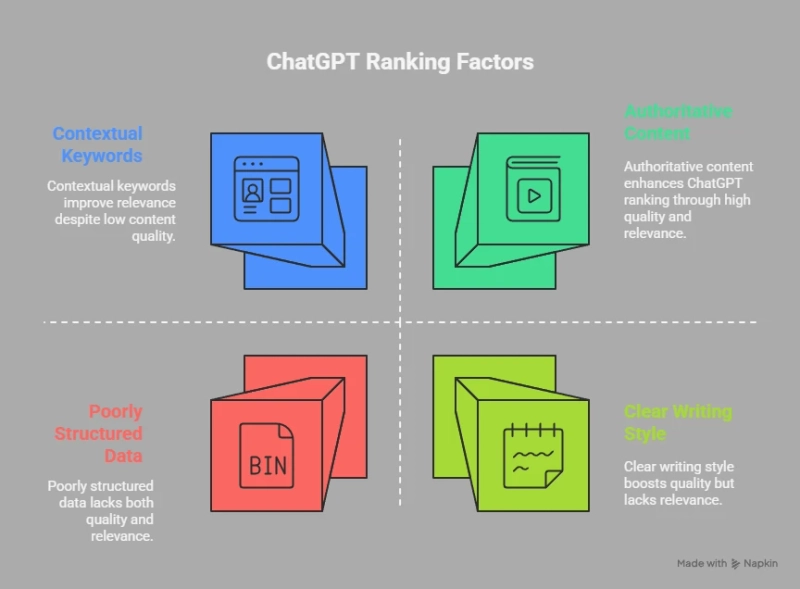In the fast-changing digital world, search and discovery are evolving. Businesses and content creators are no longer focusing only on Google’s algorithm — they are now asking a new question: “How do you rank in ChatGPT results?” With the rise of Search GPT and AI-driven search experiences, visibility depends on more than traditional SEO. Instead, it requires understanding ChatGPT ranking factors and how AI processes information. Let’s explore how ranking works in this new AI-powered landscape and what you can do to stay ahead.

Understanding the Shift: From Search Engines to AI Overview
Traditional search engines, like Google, rely heavily on crawling, indexing, and ranking content based on links, keywords, and user engagement. But ChatGPT and other AI search models operate differently. Instead of showing ten blue links, AI gives a direct, conversational AI overview — a summarized, user-friendly response.
This means users often get one main answer instead of multiple search results. If your brand or content isn’t part of that answer, you lose visibility. That’s why learning how to rank in ChatGPT is becoming as important as SEO itself.
What Does “Rank in ChatGPT” Mean?
When people talk about how to rank in ChatGPT results, they are referring to whether AI includes their content, product, or brand within its generated response. Unlike Google, there is no fixed position like rank #1 or #5. Instead, your goal is to be mentioned, referenced, or recommended by ChatGPT in its AI-generated overview.
For example:
- If someone asks, “What is the best digital marketing company in Delhi NCR?” — ChatGPT may generate an overview listing top agencies. Ranking here means your agency appears in that generated list.
Key ChatGPT Ranking Factors
Just like Google has ranking factors (backlinks, keywords, authority), ChatGPT has its own set of signals. While not officially published, experts identify some key ChatGPT ranking factors:
- Content Quality & Authority: AI models prioritize well-researched, factually accurate, and trustworthy content. Authoritative sources, backed by expertise, are more likely to be included.
- Structured Data & Clarity: Clear, structured, and easy-to-read content ranks better in AI responses. Bullet points, FAQs, and summaries help AI process information efficiently.
- Relevance & Context: AI looks for contextually relevant answers. If your content directly addresses a question (e.g., “What is Search GPT?”), you have a higher chance of being included.
- User Engagement Signals: Content that performs well with users — through shares, comments, or backlinks — signals credibility and usefulness, which AI may recognize.
- Freshness & Updates: Since AI relies on training data and connected sources, updated content with recent statistics or trends ranks higher in AI overview sections.
Optimizing Content for Search GPT
If you want to rank in ChatGPT, you must create AI-friendly content that aligns with Search GPT models. Here’s how:
- Answer Direct Questions Clearly: Use headings and FAQs to target conversational queries like “What is ChatGPT ranking?” or “How does Search GPT work?”
- Use Semantic Keywords: Don’t just repeat your main keyword — expand with variations. For example: “ChatGPT ranking factors,” “rank in ChatGPT,” “AI overview in search.”
- Build Topical Authority: Publish consistent content around a niche. If your website consistently writes about AI, ChatGPT, and search optimization, AI will recognize you as a reliable source.
- Provide Evidence and Examples: Use case studies, statistics, and expert opinions. AI models prefer content backed by facts, not just opinions.
- Update Regularly: Refresh old blogs and add new insights. A page last updated in 2020 is less likely to rank in ChatGPT compared to fresh, 2025-relevant content.
How Businesses Can Benefit from ChatGPT Rankings
Ranking in ChatGPT results has major benefits for businesses:
- Higher Visibility in AI Overview: If your brand is part of ChatGPT’s summarized answers, you capture immediate attention.
- Authority & Trust: Being cited by an AI system signals expertise, boosting brand reputation.
- Lead Generation: If AI suggests your business when users ask for “best companies” or “top services,” you directly attract new customers.
- Future-Proof Marketing: As Search GPT grows, being optimized for AI ensures long-term relevance.
The Future of SEO: Blending with AI Optimization
SEO isn’t going away, but it is changing. To succeed, businesses must balance traditional SEO with AI search optimization. This includes:
- Creating conversational content aligned with how users ask questions.
- Leveraging ChatGPT ranking factors like authority, clarity, and freshness.
- Optimizing for both Google rankings and AI overview visibility.
Forward-thinking marketers are already treating rank in ChatGPT as a core digital strategy, not just an experiment.
Conclusion
The question is no longer only “How do I rank on Google?” but also “How do I rank in ChatGPT results?” With the rise of Search GPT and AI-driven search, visibility depends on creating content that is clear, authoritative, relevant, and regularly updated. By focusing on ChatGPT ranking factors and understanding how the AI overview works, businesses can future-proof their online presence.
The sooner you adapt to this shift, the better positioned you’ll be in the next generation of search.


